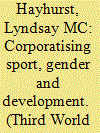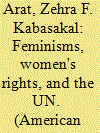| Srl | Item |
| 1 |
ID:
105409


|
|
|
|
|
| Publication |
2011.
|
| Summary/Abstract |
The 'Girl Effect' is a growing but understudied movement that assumes girls are catalysts capable of bringing social and economic change for their families, communities and countries. The evolving discourse associated with this movement holds profound implications for development programmes that focus on girls and use sport and physical activity to promote gender equality, challenge gender norms, and teach confidence and leadership skills. Increasingly sport, gender and development (sgd) interventions are funded and implemented by multinational corporations (mncs) as part of the mounting portfolio of corporate social responsibility (csr) initiatives in international development. Drawing on postcolonial feminist ir theory and recent literature on transnational private governance, this article considers how an mnc headquartered in the global North that funds a sgd programme informed by the 'Girl Eeffect' movement in the Two-Thirds World is implicated in the postcolonial contexts in which it operates. Qualitative research methods were used, including interviews with mnc csr staff members. The findings reveal three themes that speak to the colonial residue within corporate-funded sgd interventions: the power of brand authority; the importance of 'authentic' subaltern stories; and the politics of the 'global' sisterhood enmeshed in saving 'distant' others. The implications of these findings for sgd are discussed in terms of postcolonial feminist approaches to studying sport for development and peace more broadly.
|
|
|
|
|
|
|
|
|
|
|
|
|
|
|
|
| 2 |
ID:
143139


|
|
|
|
|
| Summary/Abstract |
Although all theories that oppose the subordination of women can be called feminist, beyond this common denominator, feminisms vary in terms of what they see as the cause of women's subordination, alternatives to patriarchal society, and proposed strategies to achieve the desired change. This article offers a critical examination of the interaction of feminist theories and the international human rights discourses as articulated at the UN forums and documents. It contends that although a range of feminisms that elucidate the diversity of women's experiences and complexities of oppression have been incorporated into some UN documents, the overall women's rights approach of the UN is still informed by the demands and expectations of liberal feminism. This is particularly evident in the aggregate indicators that are employed to assess the “empowerment of women.” In addition to explaining why liberal feminism trumps other feminisms, the article addresses the problems with following policies that are informed by liberal feminism. Noting that the integrative approach of liberal feminism may establish gender equality without empowering the majority of women, it criticizes using aggregate indicators of empowerment for conflating sources of power with empowerment and making false assumptions.
|
|
|
|
|
|
|
|
|
|
|
|
|
|
|
|